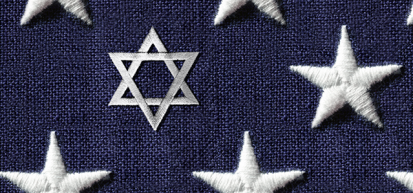Rich Cohen, perhaps best known for his book Tough Jews, just wrote the most crystal-clear explanation of the current state of American Jews on Tablet. He answered things I didn’t even know I was wondering about. Here are some of Cohen’s main points, via quotes taken directly from his essay:
Our seven-decade bubble
“The unimaginable evil of the Holocaust seemed to kill anti-Semitism, even the polite country-club variety that shows up in the work of F. Scott Fitzgerald and Ernest Hemingway. After the war, Hemingway disavowed Jewish jokes, which, he seemed to realize, were connected, in some way, to what happened. It created a bubble, a zone of safety not only for Jews but for other minorities. It’s no coincidence that the civil right movements came in the wake of WWII. Anti-Semitism still existed of course, but, in America, it became socially unacceptable. It retreated to the bedrooms and parlors, where it was expressed in the way of certain mystery religions, in secret, behind closed doors, so quietly you might think it had vanished.
“This is my childhood, the world where I grew up. The horror of the Holocaust purchased us a 70-year vacation from history, though we didn’t know it. We believed the world had changed, as had human nature. Jews remained distinct in the new dispensation, but in a good way—a near-at-hand exotic, a symbol of exile, which we were told was the natural state of modern man. For perhaps the only time in history, you might actually want to be a Jew. Because of the close families and good husbands and yada yada. Saul Bellow, Phillip Roth, Mel Brooks. To those of us who came of age in these years, the future seemed like it would be more of the same, the present carried on forever.
Jews can no longer pass
“It’s as if Jews are bell-bottoms or fringed coats. Once upon a time, we’d been in fashion, but not anymore. What you have now is a return to the green-screen hatred, which, like malaria, spikes and remits but never goes away.”
What changed?
“Well, for starters, there are just fewer of us in proportion to the whole. Whereas Jews once constituted five percent of America, and as much as forty percent of New York, those numbers have shrunk. We’re perhaps thirteen percent of New York and around two percent of the nation. In this sense, American Jews are living with the results of their success. This is indeed the promised land. It’s where Jews fulfilled the dream which, for many, has been to stop being Jews and become part of the imagined whole. Like the caboose of a train, we’re getting smaller as we go away.”
What else?
“Which brings up the second point—the Holocaust, which is one reason there are so few Jews. We lost almost half our population not long ago. “Never Forget” is one of the admonitions we heard in Sunday School. But people do forget. Everything, all the time. As the events exit living memory, as the people who survived it as well as those who liberated the camps, die, tragedy shifts from memory to history. As memory fades, the old thing returns, filling the subterranean cisterns.”
The all too common conflation of Israel with Judaism
“Some attribute the hatred to the policies of Israel. (“Bibi is to blame.”) But this confuses cause and effect. Israel is not the source of anti-Semitism, but a result. Before the Holocaust, it was said that the Jews in their statelessness were the cause of wars and disturbance, the burr under the saddle of mankind, the ghost in the machinery of statecraft. After the Holocaust, it’s said that Israel, the Jewish State, is the burr under that saddle. Though the condition has changed—no state v. state—the conclusion remains the same: It’s the Jews. To me, this is the world settling back into the Jew-loving and Jew-hating equilibrium that was unsettled, for a time, by the Shoah. After, all, the dream of the early Zionists was neither to be hated, nor loved—it was to be normal, treated as individuals, like everyone else.”
(This is Julie speaking now, up until here it was all quotes from Rich Cohen’s piece)
Although this is not wonderful news, it brings me some relief. I realize that I’ve been trying to make sense of what’s going on, why there’s been such a surge of anti-Semitic acts of late, and this helps me understand it better in a historical context. It’s not that the last seven decades have been idyllic, but they have certainly been a reprieve from what came before. If it indeed represents just a lull in the hatred and vitriol, we have our work cut out for us. We will not be silenced.
*This is Cohen’s phrase; I just used it for my headline because it was a perfect encapsulation.

